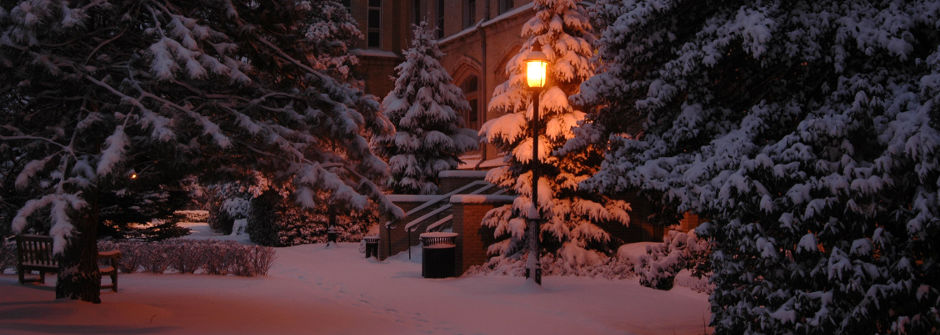
Severe Winter Weather
Winter weather will soon arrive. It is a good time to think about hazards that may confront us during the winter season. Severe winter weather such as heavy snow, blizzards, and ice storms can pose multiple hazards including, high winds, decreased visibility, dangerously low temperatures, road and sidewalk icing, and blocked roads. Driving, walking, and other outdoor activities can be dangerous under such conditions.
- Monitor severe winter weather conditions and adjust your activities accordingly. Avoid unnecessary travel or outdoor activities.
- Wear several layers of loose-fitting, lightweight, warm clothing rather than a single layer of heavy clothing. Layering allows you to adjust the amount of insulation based on your outdoor activity to prevent sweating. Sweat-soaked clothing in cold weather can lead to hypothermia. Have an outer layer available that is tightly woven and water repellent.
- Protect your extremities. Wear a warm hat that covers your ears, a scarf or face mask to cover your mouth, gloves or mittens, and insulated boots. This will help prevent frostbite.
- Avoid overexertion in cold weather. For example, overexertion while shoveling snow can cause a heart attack, a major cause of death in the winter.
- Watch for signs of frostbite. These include loss of feeling and a white or pale appearance in extremities such as fingers, toes, ear lobes, and the tip of the nose. If signs of frostbite are detected, warm the body part slowly and get medical help.
- Watch for signs of hypothermia, a dangerous lowering of the body’s core temperature. These include uncontrollable shivering, slurred speech, drowsiness, and apparent exhaustion. If symptoms are detected, get the victim to a warm location, remove wet clothing, warm the body core (place victim in blanket or sleeping bag with another person), and give warm, non-alcoholic drinks if the victim is conscious. Get medical help as soon as possible.
- Fuel your vehicle before the storm. Drive only if it is absolutely necessary. If you must drive, travel during the day, don’t travel alone, stay on main roads and avoid back road shortcuts, and keep others informed of your schedule.
- Maintain a home Disaster Supply Kit in case severe winter weather prevents you from going out for supplies or causes a power failure. The kit should contain battery-powered radio, blankets/sleeping bags, first aid supplies, flashlights and extra batteries, medications, a minimum three-day supply of nonperishable food and water, and pet items and baby items, if applicable.
- Have a “GO Kit” in your car containing essential emergency items in case you get stranded on the road (food, water, blankets, flashlight and extra batteries, cellphone, etc.).
- Drink plenty of non-alcoholic fluids and eat high-caloric foods to help maintain body heat.
If severe winter weather keeps you in your home
- When using supplemental heating sources such as fireplaces or kerosene space heaters in your home, make sure you have proper ventilation and a carbon monoxide detector in place. DO NOT use charcoal-burning devices indoors.
- Keep space heaters away from flammable materials. Never leave them unattended. Always take your space heater outside to refill it. Remember: such supplemental heating sources are not permitted in SHU facilities.
- Open spigots to allow a small, continuous drip to prevent freezing pipes—open cabinet doors to allow heat to get to uninsulated pipes under sinks and appliances near exterior walls.
- Move your vehicles inside a garage, if possible. Never leave a vehicle running with the garage door closed.
If a blizzard traps you on the road
- Turn on hazard lights and hang a distress flag from the vehicle antenna. Remain in your vehicle where rescuers are most likely to find you. Do not set out on foot unless you can see a building close by where you know you can take shelter. Remember that a building may seem close, but be too far to walk in deep snow.
- Run the engine and heater for about 10 minutes each hour to help stay warm. When the engine is running, open an upwind window slightly for ventilation. Periodically clear snow from the exhaust pipe.
- Exercise to maintain body heat, but avoid overexertion and sweating. In extreme cold, you can use seat covers, road maps, floor mats, etc., for insulation. Huddle with other passengers to share body warmth.
- Take turns sleeping. One person should be awake at all times to signal rescue crews.
- Drink fluids to avoid dehydration (even if you don’t feel thirsty).
- Do not waste battery power. Turn on the inside light at night so that rescuers can see you.
- If stranded in a remote area, stomp large letters in an open area to spell out HELP and line with brush or tree limbs to attract the attention of airborne observers.
Seton Hall Winter Weather Closings
The University Administration will announce decisions regarding postponement or suspension of campus activities or closure of the University through PirateAlert and the SHU website.
- Stay informed. Information will be broadcast to the Seton Hall community via PirateAlert, the Seton Hall main page, Emergency Communications page, Facebook, Twitter, and the Law School Web Site. In addition, a message is left on the University phone system, South Orange Campus x9000, Law School x 8725.
Help keep campus parking lots clear during snowstorms or in anticipation of a predicted snowstorm. Drivers should try to park in the parking deck or in available parking spaces under buildings to minimize the number of cars in areas that will need to be plowed.
